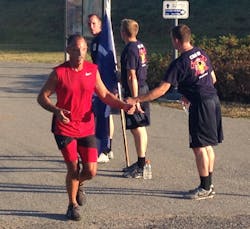We’ve likely all been there—a great conference, lots of new ideas, inspirational speakers, a renewed focus on firefighter health, wellness, fitness and behavioral issues. So what’s the problem, chief? Look around the room. I bet you see and experience the same hypocritical things I see and experience at most of these conferences. At the obvious danger of being the “pot-calling-the-kettle-black,” this article is a short critical analysis—of ourselves.
How many beer guts do you see? How many of your conference brothers and sisters were in the hotel fitness center or thumping the streets with you this morning? Did you pay attention during that “Firefighter Health and Wellness” seminar this morning? How many of your brothers and sisters are slamming them down at the open bar this evening? On a darker note, have you known a firefighter who committed suicide?
Have you looked in the mirror lately? I’m not suggesting a narcissistic look in the mirror, although let’s face it, we ALL have a few healthy narcissistic tendencies. No, I’m talking about our hypocritical look in the mirror—one of our dirty little secrets.
We’ve talked before about the need for moral focus, mental toughness, physical strength, and vision as the “Leadership Tetrahedron.” The vision for this article is ultimately focused on lifestyle choices and how that affects the health and wellness of our members. The moral focus will center on making best-interest decisions; mental toughness will focus on peer pressures and self-recognition; and physical strength will focus on the need for a physical fitness and nutrition approach that builds all three—moral, mental and physical strength.
Food and drink
The ONLY thing I’ll talk about in this article that’s not a “choice” is food and drink. If we don’t eat and drink, we don’t live. But that doesn’t mean we can eat and drink whatever we want. There has to be a balance, and there is NO cookie-cutter plan that will work for everyone. Each of our physiological responses to sustenance—essentially metabolism—differs. What works for you or me will likely not work for the person sitting next to you.
I’m convinced that the “what’s best” diet doesn’t exist, and indeed it changes every time someone else doesn’t succeed on the last diet. I made the personal decision about 10 years ago to lose weight and improve my moral focus, mental toughness and physical strength. The three basic things that worked (and continue to work) for me are 1) reduction of sugar intake, 2) time-management of the foods I eat and 3) a regular physical fitness program. Over the course of the first 5 years, I lost 70 pounds, have maintained that loss for 5 additional years and (here’s the narcissistic look in the mirror), I am arguably in the best physical, mental, and moral shape of my life. Let’s review these three components.
Reduction in sugar intake: I started drinking bottled spring water and stopped drinking sugar-filled drinks. Oh, it was difficult, but one thing I read convinced me to take a second look: “A can of
Coke has the equivalent of 7 tablespoons of sugar.” Think about that for just a second. I used to have one or two large fast food fountain sodas each day. One day I tested the 8-oz. can of Coke and found that it filled the 32-oz. ice-filled cup nicely. That meant I was consuming 7 to 14 tablespoons of sugar in just those two drinks EVERY DAY. That doesn’t even begin to measure the food sugars and other drink sugars I was consuming as well. It may be a little bit of a cold-turkey moment for you, but dump those 14 heaping tablespoons of sugar in a small cup and look at that; it should be a wake-up call. I replaced the Cokes with Diet Coke, then eventually learned that the carbonation was holding back my ability to lose belly fat, so I replaced that with unsweet tea. Yeah, I know, we’re all going to die from something, and somebody will say the tea leaves are going to kill me … OK.
Food time-management: I did not change my morning routine. Those who have known me know that’s water and one pack of cinnamon-flavored Pop Tarts. It USED to be the 32-oz. Coke and a bacon/egg/cheese biscuit. Acknowledging that’s not the healthiest choice, the main difference in MY food time management did not center on five or six “little” meals. I tried that approach; it didn’t work for me. I tried the smaller plate, but just piled more on or went back. I tried salad and found that I’m not a real leaf eater, so it just left me hungry. I tried carb-restriction, and twice lost and re-gained 50 pounds. Ultimately, with the approval of my wife, I resorted to a larger lunch and small- or no-dinner approach six days a week. We still eat out one night a week. I just adjust lunch that day. The large lunch has shrunk over time, mostly because of the peer pressure as I kept eating while others were done. I also slowed down while eating, put the fork down in between bites and finally, when I knew I had eaten too much but still felt like I wanted more, I’d put some trash on my plate, forcing me to stop. The small- or no-dinner approach generally revolves around “time.” If I’m going to eat something at dinnertime, I endeavor to eat no later than 6:30 p.m. This approach seems to keep MY metabolism in check. I recognize it might not work for you or the next person. The key is to find what works for you.
Regular physical fitness: I liked jogging, that is, until I missed a big fire because I injured my knee doing it. Then I hated jogging. But I still recognized how important it was, especially when I began to gain weight while not jogging. If you’re going to be successful in the Leadership Tetrahedron, both cardio and strength training MUST be a part of your repertoire that helps build both mental toughness and physical strength. These days, I’m in my “spring” program—in the gym 7 days a week, 4:30 a.m. During spring, it’s 25 to 35 minutes of cardio, 7 days a week, with 60 to 90 minutes of strength training 5 days a week. All other seasons are 60 to 90 minutes of cardio and strength combined, 4 to 5 days a week, dependent on weather, schedule, travel and fatigue.
Mine is just an example. Diet and exercise the way and time that works for you—just do it. If you’re not an early riser, I get it, you’re not going to get in the gym at 4:30 a.m. Get in there at 6 or 7 p.m.—whatever works for you. Don’t like Pop Tarts? Have a banana, orange, bran or bacon and eggs. Remember, the nutritional advice is all over the place. Regardless of what works for you, remember that nearly 65 percent of our line-of-duty deaths are directly or indirectly related to cardiovascular issues, so diet and exercise could quite literally be the difference between life and death.
Next month
Next month we’ll review some of our other dirty little secrets—alcohol and drugs, mental health issues and reckless driving.






